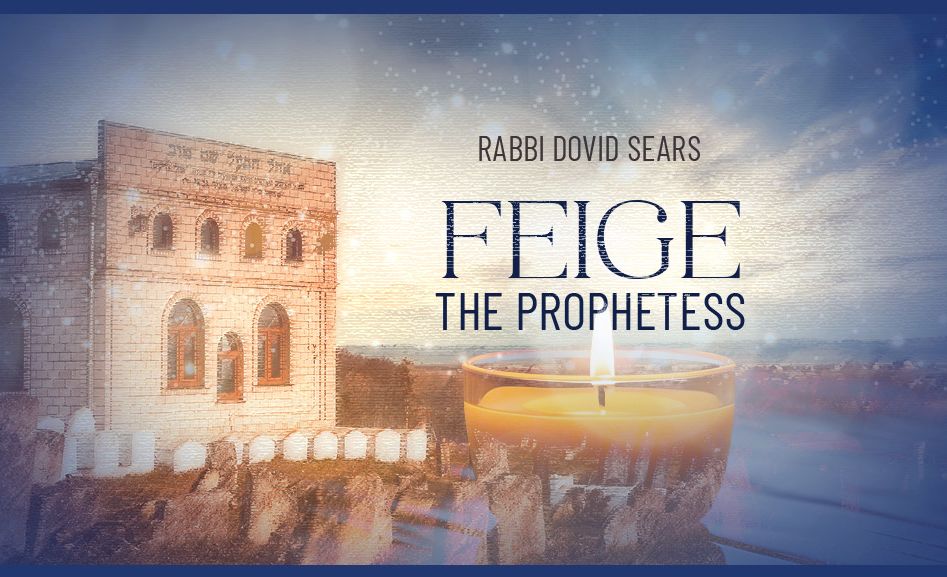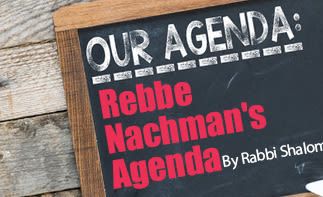
Focusing on Me
Many things are done in the name of "Breslev", but they're frequently far away or even total opposites of Rebbe Nachman's true teachings. Be careful...

Nearly two years ago, I attended a ‘kosher’ Jewish, self-discovery workshop. It was a 10-week course, run by a certain Breslev organization (not Breslev Israel), and it seemed to hold the answer to really, finally fixing myself. I had dreams of finally getting rid of all my fears and anxieties, finally becoming happy with my life and finally fulfilling all of that potential that was otherwise going to waste.
Ten weeks, and two years, later I’m just now getting out of the deeper pit I dug for myself.
I spoke with a learned Rabbi before writing this, in order to make sure that it both within Jewish law and appropriate to make the following comments concerning a potentially, very damaging course being offered to our community.
It’s forbidden to stand by and watch as you see your brother’s blood – physical or spiritual – being spilled. Where physical, spiritual or emotional damage is involved it’s actually an obligation to speak out.
Before we get into the specifics, we need some background. ‘Bitul’, or self-nullification to G-d, is perhaps the essence of Rabbi Nachman’s teachings and, perhaps also the essence of Judaism. Rabbi Nachman explains that all of our negative behaviors and sins have their roots in pride and arrogance. The antidote, and the way to fix my soul and get close to G-d, is humility, which means to cancel, or bitul, myself – meaning my ego, my arrogance and all my bad character traits.
Rav Israel Salanter, the head of the Mussar (Jewish self-discipline) movement, said that it was easier to learn  the whole Talmud than to change one bad character trait. We’re talking about many years of prayer to achieve true humility and to cancel out our arrogance and pride.
the whole Talmud than to change one bad character trait. We’re talking about many years of prayer to achieve true humility and to cancel out our arrogance and pride.
There are no short cuts in serving G-d; but the Evil Inclination loves to tempt us with short cuts, and he’s prepared to dress them up in the most holy clothing. In fact, it’s the best way to dress up the road to Hell, and because it’s what gives us our free choice, G-d lets the Evil Inclination get away with it.
So, how is our Evil Inclination leading us astray in the case in point? Through the very tempting lie that, rather than having to painstakingly nullify all of my bad behaviors through hours of prayer, and to cancel my pride and arrogance through great mesirut nefesh (self sacrifice), I can achieve my soul correction through an alternative route, called ‘Self-Actualization’.
Self-Actualization is a process or a perspective which says YOU are the most important thing in the world, don’t let anyone tell YOU otherwise, don’t let anyone or anything stand in YOUR way, accept that YOU have needs, make YOURSELF a reality, stand up for YOURSELF and actualize YOUR potential.
In the secular world, self-actualization isn’t just a good thing, it’s probably the greatest thing a person can do with their life. But, we’re trying not to live by the values of the secular world. We have G-d and we have Torah and we have our true Tzaddikim (righteous individuals) to teach us how to serve G-d.
The truth is, self-actualization is in fact the direct opposite of self-nullification. How? One says, “I’m everything” and the other says, “I’m nothing”. One says, “G-d is everything”- which is the peak of emuna – and the other says “I am everything”, which is the peak of arrogance.
Around 2 years ago, I attended an apparently Breslev ‘self-actualization’ course that supposedly aimed at lifting up the spiritual hood, and trying to fix whatever was broken.
It’s perhaps important to say that I was very much in favor of the work shop during the program itself and continued to be enamored with it for several months following it. I even advised a number of friends that it would be good for them to do it, too.
So, why now am I coming out strongly against it? Firstly, a person has to be clear that in life we can get something wrong. Very wrong. We have to be able to turn a full 180 and admit I completely stuffed up. The truth should be the only relevant thing that matters. Secondly, it’s taken me nearly two years now to recover from that course. Until now I haven’t been in a position to speak about it and, of course, until now G-d has not put it into my head or heart to do so.
One of our friends who was thinking of taking the course went to check with a certain leading Rabbi, and he advised not to do it. He told her that the problem with these types of workshop is that the participants can end up losing their Yirat Shamayim (fear of Heaven).
Why? Because if the foundation of the workshop is that ‘you can fix yourself’ then in Torah language that’s called “Kochi v’otzem yadi” (the strength and power of my own hand). You cannot fix yourself. Only G-d can fix you. Take G-d out of the picture and there goes your Yirat Shamayim (and also probably your World to Come).
The course in question ‘requires’ participants to do some hitbodedut (personal prayer). So, it could be argued that they don’t expect you to fix yourself, but rather to turn to G-d.
That’s the theory, but in practice that simply wasn’t happening. Firstly, when I was on the course, whilst there was an expectation to do some hitbodedut, the truth is that less than half the course was actually doing any serious hitbodedut – at least one guy admitted to me he did almost zero hitbodedut the entire 10 weeks. And, even those who were doing half an hour or an hour a day were given zero instruction on what they were meant to be doing in that hitbodedut (which is particularly relevant because probably the majority never did any hitbodedut beforehand and had no clue what they were doing).
Further, not once did I ever hear anyone on the course ever suggest that G-d was going to fix anything.
The truth is that only G-d can heal me, but G-d was almost 99% non-existent on the course I took. That means that the entire foundation of the course was very far from what may be called ‘acceptable Judaism’.
Next, Rabbi Nachman teaches us that the primary way of addressing others, even very evil people, is to look for their good points. This together with bitul, are probably two of the most prolific pieces of advice throughout all of his writings. Yet, this apparently Breslev-based course, finds its strength in the direct opposite: they tear people down, and in public too. All for a good end, of course: ‘we need to break you, in order to fix you’ – but that’s not Judaism, and it’s certainly not Rabbi Nachman’s teachings, no matter how you look at it. It’s not a Breslev way and it’s not a Jewish way.
Again, it might be fine in the secular world, but it’s not Judaism. And if it’s not in the Torah – or more pointedly, if it’s actually against Torah law (causing hurt through speech, embarrassing people in public, causing arguments between family members), then it’s very dangerous and it’s forbidden.
A Dayan [a Jewish judge very knowledgeable in halachic law] confirmed to me that discussing a person’s parents and how they were treated at home – even if done in private, one-on-one, with a trained professional – is a very delicate halachic area. Discussing these issues in public, in front of 40 to 50 people, is in his words “very problematic”. Which I understood to be his polite way of saying it was not permitted.
How dangerous is it to get involved in something like this? Well, I’ve heard that divorces and near suicides have resulted, ‘apparently’ from having gone through this particular course, although clearly those things can’t be conclusively linked.
However, I can tell you that on a personal level, I went through some very dark times during that course. Not that I recognized it as so terrible at the time. Rather the opposite. ‘It will all be for the good in the end’, I thought at the time. Plus I got the fake spiritual high of “taking things into my own hands, controlling my own destiny, etc” which also hides a lot of the problem.
But the truth is, when I look back now, I see that I could have killed my marriage and myself too in the process, and what did I gain? Really almost nothing. I’ve been in a very dark place (occasionally pondering whether it was even worth living) during the last 2 years. The workshop was great for showing me how bad I really am on the inside, and leaving me by myself to wonder how on earth I was ever going to change. Rabbi Nachman says a person needs to be a huge Tzaddik to give rebuke that doesn’t cause a person to hate himself and there are very few of those around today.
Why could it have killed my marriage? Because for at least a year following the ‘self-discovery’ process I became completely self-absorbed. I was the only one that mattered and I hardly had any time or head-space to think about my wife and kids. Without a strong attachment to Rav Arush’s teachings, it would have been easy to come out of this workshop with the mantra of “I deserve to have my own opinion and fulfill my own desires” burned into my psyche.
After having been shown clearly that a person was not loved by his parents, and that he’s in fact getting emotionally beaten up and abused by lots of people around him, it’s not surprising that people come out of this course demanding their right to speak their mind to anyone they choose, demanding their right to express their anger, and demanding their rights to have their emotional needs met by their wives – which is pure nonsense. It goes against Torah, whether it’s Rabbi Nachman’s teachings or any other serious Halachic opinion.
It’s also a recipe for a broken home. What wife is going to put up with such utter selfishness? G-d is trying to teach us self-nullification, and this course is promoting the direct opposite, that is self-actualization, (which means of course that I put myself first at the expense of everyone else around me – my wife, my kids, my work colleagues etc.) Not long after the course ended, I actually quit my job at the law firm I worked at, because I decided my boss wasn’t treating me with enough respect!
When I heard recently that a number of people who had done this course had suffered similar problems it really started me thinking. I started to unpick what exactly went on in that course and what it actually did to me. Honestly, and unexpectedly, I started to see really how bad it was and how far away from genuine Torah values it is. As I began doing so, I began to see a spiritual light start to illuminate that darkness inside me. As I started to deconstruct and remove that ‘programming’ from my soul, I began to feel a enormous weight lifting from me.
It not possible to speak out everything I would like to say in this article, but I hope from the information I have tried to give, you will seriously conclude that a Jew who wants to follow G-d’s Torah should stay away from this type of course. Halachically, and for your own mental health, this is not the way to get closer to G-d, and it’s not the way to fix your bad character traits. It might be the way to gain yourself ‘more effective personal power over other people’ – but you do so at your own risk. Rabbi Nachman taught us the only way to salvation is through heartfelt prayer. Don’t let anyone try to tell you otherwise.
How can one avoid the many things are done in the name of “Breslev”, but that are often far away or even total opposites of Rebbe Nachman’s true teachings? Attach yourself to one of Breslev’s true spiritual guides, connected to the tradition of Rebbe Nachman’s teachings in an unbroken chain of rabbi to pupil all the way back to Rebbe Nachman himself. Our esteemed and beloved teacher Rabbi Shalom Arush is one such spiritual guide.







3/25/2014
I agree I agree and not only about courses but also beware spiritual guides and rabbis who claim to speak for Hashem or the Tzaddik who is no longer living. We are able to attach ourselves to G-d without any help from anyone else, because the tzaddik alone helps us. Why do we pray at the graves of tzaddikim? Because we can, and we don't need someone else to tell us that we can't, or that his tefillot are stronger than ours. rabbi Nachman says anyone can talk to Hashem, and it's free. Beware of MONEY
3/25/2014
I agree and not only about courses but also beware spiritual guides and rabbis who claim to speak for Hashem or the Tzaddik who is no longer living. We are able to attach ourselves to G-d without any help from anyone else, because the tzaddik alone helps us. Why do we pray at the graves of tzaddikim? Because we can, and we don't need someone else to tell us that we can't, or that his tefillot are stronger than ours. rabbi Nachman says anyone can talk to Hashem, and it's free. Beware of MONEY
3/24/2014
On developing a real connection to HaShem Anyone look for a practical road map to attain a real connection to HaShem should learn the seforim of Rav Ithamar Schwartz – Bilvavi Mishkan Evneh, Getting to know your Soul, Getting to know yourself and many many more. These seforim are incredibly helpful and many have been translated into English. And of course it goes without saying that Rav Arush has many wonderful seforim as well. We live in olam hasheker (I am not commenting of the course mentioned above – I don't know about it) and we have to be so careful with our neshamas and daven A LOT that HaShem should guide us to the right people and in the right direction.